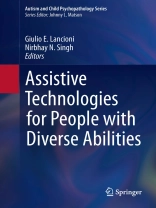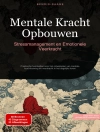The familiar image of the disabled tends to emphasize their limitations and reduced quality of life. However, many people with cognitive, motor, and other difficulties also have the capacity to enhance their social interactions, leisure pursuits and daily activities with the aid of assistive technology. Assistive devices from the simple to the sophisticated, have become essential to intervention programs for this population. And not surprisingly the numbers of devices available are growing steadily.
Assistive Technologies for People with Diverse Abilities offers expert analysis of pertinent issues coupled with practical discussion of solutions for effective support. Its comprehensive literature review describes current and emerging devices and presents evidence-based guidelines for matching promising technologies to individuals. Program outcomes are assessed, as are their potential impact on the future of the field. In addition, chapters provide detailed descriptions of the personal and social needs of the widest range of individuals with congenital and acquired conditions, including:
- Acquired brain damage.
- Communication impairment.
- Attention and learning difficulties (with special focus on college students).
- Visual impairment and blindness.
- Autism spectrum disorders.
- Behavioral and occupational disorders.
- Alzheimer’s disease.
- Severe, profound and multiple impairments.
The scope and depth of coverage makes Assistive Technologies for People with Diverse Abilities an invaluable resource for researchers, professionals and graduate students in developmental psychology, rehabilitation medicine, educational technology, occupational therapy, speech pathology and clinical psychology.
Table of Content
Chapter 1. Assistive Technologies for Improving Quality of Life; Giulio E. Lancioni, Nirbhay N. Singh.- Chapter 2. Assistive Technology for People with Acquired Brain Injury; Mandy Rispoli, Wendy Machalicek, Russell Lang.- Chapter 3. Assistive Technology for Postsecondary Students with Disabilities; Russell Lang, Sathiyaprakash Ramdoss, Jeff Sigafoos, Vanessa Green, Larah van der Meer, Amy Tostanoski, Allyson Lee, Mark O’Reilly.- Chapter 4. Assistive Technology for People with Communication Disorders; Jeff Sigafoos, Ralf W. Schlosser, Giulio E. Lancioni, Mark F. O’Reilly, Vanessa A. Green, Nirbhay N. Singh.- Chapter 5. Assistive Technology for Students with Visual Impairments and Blindness; Austin M. Mulloy, Cindy Gevarter, Megan Hopkins, Kevin S. Sutherland, Sathiyaprakash T. Ramdoss.- Chapter 6. Assistive Technology for People with Autism Spectrum Disorders; Russell Lang, Sathiyaprakash Ramdoss, Tracy Raulston, Amarie Carnet, Jeff Sigafoos, Robert Didden, Dennis Moore, Sam Di Gangi, Mark O’Reilly.- Chapter 7. Assistive Technology for People with Behavior Problems; Mark O’Reilly, Giulio E. Lancioni, Jeff Sigafoos, Russell Lang, Olive Healy, Nirbhay N. Singh, Audrey Sorrells, Soyeon Kang, Heather Koch, Laura Rojeski, Cindy Gevarter.- Chapter 8. Assistive Technology For People With Alzheimer’s Disease; Nirbhay N. Singh, Giulio E. Lancioni, Jeff Sigafoos, Mark O’Reilly, Alan S.W. Winton.- Chapter 9. Assistive Technology for Individuals with Learning Disabilities; Diane P. Bryant, Brian R. Bryant, Min Wook Ok.- Chapter 10. Assistive Technology for People with Severe/Profound Intellectual and Multiple Disabilities; Giulio E. Lancioni, Nirbhay N. Singh, Mark F. O’Reilly, Jeff Sigafoos, Doretta Oliva.
About the author
Giulio E. Lancioni, Ph.D., is Professor in the Department of Neuroscience and Sense Organs, University of Bari, Italy. Prior to this position, he spent many years at the Department of Psychology, University of Leiden, The Netherlands. His research interests include development and assessment of assistive technologies, training of social and occupational skills and evaluation of strategies for examining preference and choice with individuals with severe/profound intellectual and multiple disabilities (including post-coma persons in a minimally conscious state and persons with Alzheimer’s disease). He has published widely in these areas and serves in the editorial board of several international journals concerned with these topics.
Nirbhay N. Singh, Ph.D., BCBA-D, is Clinical Professor of Psychiatry and Health Behavior at the Medical College of Georgia, Georgia Regents University, Augusta, Georgia, USA. Prior to his current appointment, he was a Professor of Psychiatry, Pediatrics and Psychology at the Virginia Commonwealth University School of Medicine and Director of the Commonwealth Institute for Family Studies, Richmond, Virginia. His research interests include mindfulness, behavioral and psychopharmacological treatments of individuals with disabilities and assistive technology for supporting individuals with severe/profound and multiple disabilities. He is the Editor-in-Chief of two journals: Journal of Child and Family Studies and Mindfulness and Editor of three book series: Mindfulness in Behavioral Health, Evidence-based Practice in Behavioral Health and Children and Families.












